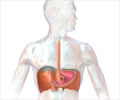Long-term treatment with proton pump inhibitor might make patients with gastroesophageal reflux disease (GERD) fat, reveals a new study.
Long-term treatment with proton pump inhibitor might make patients with gastroesophageal reflux disease (GERD) fat, reveals a new study.
GERD is the most common esophageal disorder and frequently encountered in the primary care setting.Accumulating evidence has confirmed the excellent efficacy and safety of proton pump inhibitor (PPI) therapy in patients with all grades of GERD, making these agents the mainstay of treatment.
However, the possible impact of changes in body weight (BW) or body mass index (BMI) in reflux patients while on long-term PPI therapy has not been examined.
During the study, 52 patients with GERD were treated with PPI for a mean of 2.2 years and also advised on lifestyle modifications (e.g. selective diet, weight management).
The researchers found that there was no difference in BW and BMI between reflux patients and controls at baseline.
Patients with GERD showed increases in BW, but no such changes were noted in the control group. Mean BW increased by 3.5 kg in 37 reflux patients but decreased in only 6 patients during treatment.
The study is published in the World Journal of Gastroenterology.
ARU
 MEDINDIA
MEDINDIA


 Email
Email










